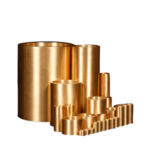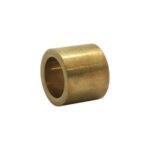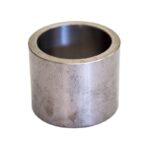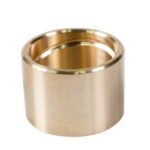Self-Lubricating Bronze Bearings & Plain Sleeve Bushings
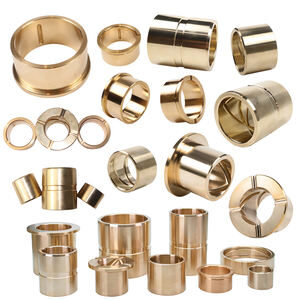
Self-lubricating bronze bearings are oilless bronze sleeve bushings also called plain bearings which are made from a mixture of copper, tin, and zinc which creates the bronze alloy. Bronze bearings are commonly found within industrial machinery where they can withstand higher loads and higher speeds than steel or plastic versions. and bronze bearings are one of the most common bearing types. They are an ideal solution for many applications like food processors, automotive PTO shafts, Washers and dryers, compressors, engine crankshaft.
Types of Bronze Bearing Material & Specification:
SAE 660:
SAE 660 bronze or c932 / c93200 bearing bronze as known as high-leaded tin, this type of bronze is commonly used for bearings or Bushing widely applications in many industries.
SAE 841:
SAE 841 bronze is sintered bronze sleeve bearings or oil-impregnated bronze bearings and phosphor bronze bearings this type of bronze is designed for self-lubricating bushing
SAE 863:
SAE 863 bronze is oil-impregnated bearings and mostly used for self-lubricating powdered metal bearing (metal bushing sleeve)that is typically harder, higher strength
SAE 954:
954 Aluminum Bronze also called manganese bronze is the alloy that offers excellent performance in grooved bushing and bearings and more applications.
Some other types of bronze for you to choose the best bronze for bearings or bushing, like silicon bronze is a metal alloy made from copper and silicon, with the addition of phosphorus. It is used in bearings because it has a very low coefficient of friction.
Phosphor bronze is also an alloy, but it has copper as its main metal. The copper in the molten alloy reacts with the phosphorus to form a layer on its surface. This layer prevents phosphor bronze from reacting with its environment, so it lasts longer than other types of alloys. Phosphor-bronze can also have additives that are not available for silicon bronze, which makes it more expensive than silicon bronze.
Cylindrical, Thrust Washers, Flange and Strips Of Composite Bushing:
Bushing MFG: Your Trust Bronze Bearings Suppliers In China
Something More About Bronze Bearings:
Should you lubricate bronze bearings?
The answer is no. Bronze bearings typically do not require lubrication because they are designed to be self-lubricating. The properties of the bronze alloy make it such that the bearings will retain their lubricating properties for a long period of time. These types of bearings are typically used in applications where low friction and wear resistance are desirable, such as in precision machinery or instruments, or when the bearing needs to operate at elevated temperatures.
What is the best bronze for bearings?
Bronze bushings or sleeve type bearing what is difference and how to choose? Everyone has their own set of advantages and disadvantages, so it is important to know what each type does before you buy one.
What you should know about bronze bearings:
– They are the most inexpensive option available.
– They are not as durable as other steel or ceramic varieties.
– They only last for a few months before they need to be replaced.
– You can’t use them in high or low temperatures, which means you can’t take them out in the rain or ride them at high speeds on an icy road.
What is the material composition of bronze bearings?
These bearings are typically composed of an alloy that is made up of copper, tin, and antimony.
Bronze bearings are typically composed of an alloy that is made up of copper, tin, and antimony. This alloy has high wear resistance because the metals are mixed in the right proportions. This results in bearing with low friction coefficient. These bearings could last for decades without much maintenance.
Bronze’s composition could be altered to change the properties of the bearing (e.g., lubrication). For example, adding lead or other metals to bronze can make it easier to machine or produce higher performance bearings with less friction coefficient than pure bronze bearings.
Are bronze bearings cost effective?
Bronze bearings are a cost-effective alternative to other bearings. They are typically less expensive and more durable than other bearing materials, such as steel or brass. The high-purity copper alloy in the bronze provides the needed lubrication for precision motion without metal-to-metal contact, meaning that bronze bearings will last longer and require less maintenance than steel or brass bushing sleeve.
What are the different types of bronze bushings?
Bronze is a metal alloy created by combining copper and tin. There are many different types of bronze bushes that are used in various applications.
The most common type of bronze bushings are Ø6mm, Ø7mm, Ø8mm, Ø9mm. This is due to the fact that they are cost-effective and have a low coefficient of friction when in contact with steel. Other types of bronze bushings include Ø10mm, Ø11mm, and Ø12mm.
Bronze bushings can be classified into three different categories: Plates, washers, and sleeves (brass sleeve bushing). For example, a plate is simply metal that has been pressed together to create a flat surface with a hole in the center.
Why choose sintered bronze bearings?
There are quite a few reasons why you should choose sintered bronze bearings over the alternatives. Let’s go over some of them.
– Sintered bronze bearings have greater load-bearing capacity than pressed steel bearings also steel backed bushings.
– They are more resistant to corrosion than other bearings, including steel and aluminum.
– They are often used in applications that require high temperatures. For example, they are often found in high-temperature gearboxes and electrical motors where their load carrying capacity is important for preventing overheating and noise.
– They can be found in a variety of shapes and sizes to suit just about any application need with many different manufacturers making them available for purchase.
